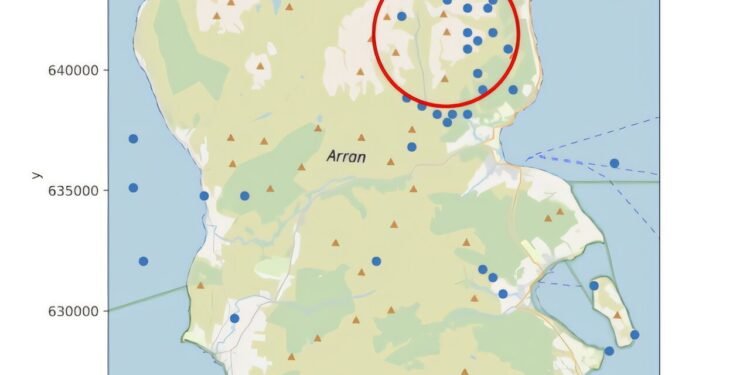
A new method of predicting where people lost in the wilderness may be found based on simulations of their decision-making processes could help mountain rescue teams save lives in the future.
Researchers from the University of Glasgow have developed a sophisticated computer system to model the actions of simulated people lost in outdoor environments.
The system, which is based on data drawn from accounts of how people in the real world behaved after finding themselves lost outdoors, creates a “heat map” showing the probability of where missing people may be found in any landscape.
The Glasgow team hope it could lead to the development of a robust new method to help search and rescue teams choose where to focus their recovery efforts, which could incorporate sensor-equipped drones to help scour the landscape.
In a new Early Access paper published in the journal IEEE Access, the team outline how they used data from historical studies of how lost people behaved in real-world situations to create simulated “agents” who act based on different psychological states.
The algorithms that underpin the agents are guided by distinct sub-models, each with a different goal in mind. They all seek to find their way back to civilization by heading for either water, trees, buildings, paths or roads. The simulated agents make decisions about where to go based on factors including their current location and whether they could see their preferred terrain.
To help inform the agents’ behavior, the team’s system also took into account data gathered on missing peoples’ likelihood of being found in different types of terrain, and the distances people typically traveled from their reported last known location.
Jan-Hendrik Ewers of the University of Glasgow’s James Watt School of Engineering is the lead researcher on the project, and corresponding author on the paper. He said, “Search and rescue teams perform vitally important lifesaving work, despite being frequently under-funded and often being crewed by volunteers.
“I grew up in the rural Highlands, and I’m a keen hillwalker, so I’m very conscious of both how dangerous hiking can be and what incredible work search and rescue teams do.
“Initially, as part of my Ph.D., I set out to see whether it would be possible to use machine learning to train a new type of search and rescue system to predict where lost hikers might be found. However, machine learning requires a vast amount of information to draw its conclusions.
“The limited resources of search teams mean they are rightly more focused on saving lives than capturing data on every aspect of their search missions, so there wasn’t enough information available for us to make that approach work.
“That led my colleagues and I to consider whether we could tap into existing research on the behavior of missing people which aims to understand their choices about where they went and why. Using that as the basis for these simulated agents has given us some really encouraging results.”
The team validated their model by setting their AI agents loose from locations dotted across a digital recreation of Isle of Arran. The probability distribution map of the simulated lost people’s locations across the island correlated strongly with the places the research team based their model on suggested they were most likely to be found. The results suggest the behavior of the agents is an accurate reflection of lost people’s behavior.
The research is part of ongoing efforts at the University of Glasgow to use cutting-edge technology to bolster the work of search and rescue teams. Related research has used a data-driven approach to explore ways of making AI-controlled drones better at searching the countryside for missing people.
Dr. David Anderson of the James Watt School of Engineering is a co-author on the paper and Jan-Hendrik Ewers’ Ph.D. supervisor. He said, “One of the advantages of this kind of psychological modeling approach to locating missing people is that it could potentially be applied to any landscape. That means it could help search and rescue teams around the world, no matter if they’re working in the mountains, jungles, or deserts.
“We’re keen to explore the possibility of applying this technique to our ongoing efforts to realize the full potential of drones for search and rescue missions. Further development work and validation will be required before it could be used in real-world situations, but this is a promising early demonstration of the effectiveness of this kind of modeling and mapping.”
More information:
Jan-Hendrik Ewers et al, Predictive Probability Density Mapping for Search and Rescue Using An Agent-Based Approach with Sparse Data, IEEE Access (2025). DOI: 10.1109/ACCESS.2025.3557693
University of Glasgow
Citation:
Computer model that ‘thinks’ like a missing person could help search and rescue efforts (2025, April 10)
retrieved 10 April 2025
from https://techxplore.com/news/2025-04-person-efforts.html
This document is subject to copyright. Apart from any fair dealing for the purpose of private study or research, no
part may be reproduced without the written permission. The content is provided for information purposes only.









